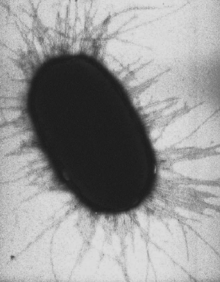roller
wiggle jiggle
- Messages
- 775
‘If these pili aren’t assembled, then these bugs aren’t infective at all. They’d wash right out.’
‘They are also important in making bacterial biofilms.
Could this be the END of cystitis? Discovery that bacteria 'lash on to urinary tract with tiny tentacles' - raises hopes of new drugs
PUBLISHED: 20:02 GMT, 13 January 2016 | UPDATED: 23:25 GMT, 13 January 2016
Urinary tract infections occur when bacteria uses tiny tentacle-like appendages to lash themselves to the urinary lining, scientists have discovered.
These appendages - called pili - are found on E.Coli, the bacteria that causes 90 per cent of urinary tract infections, including cystitis.
They are coiled tightly – just like a spring – and flex and bend like a telephone cord.
Because of these pili, bacteria is able to withstand a torrent of urine, ‘their equivalent of a tremendous hurricane'.
As a result, infection is able to flourish, a new study found.
This finding may lead to the development of new therapies to stop the bacteria and thus prevent cystitis and other painful UTIs, scientists hope.
Read more: http://www.dailymail.co.uk/health/a...les-raises-hopes-new-drugs.html#ixzz3xCUomO16
Follow us: @MailOnline on Twitter | DailyMail on Facebook
‘They are also important in making bacterial biofilms.
Could this be the END of cystitis? Discovery that bacteria 'lash on to urinary tract with tiny tentacles' - raises hopes of new drugs
- Half of women will develop urinary tract infections in their lifetime
- 90% of UTIs are caused by a form of E.coli bacteria, scientists said
- That bacteria uses tiny tentacle-like appendages to lash to urinary tract
- Coiled tightly like a spring, they flex and bend like a telephone cord
- Allows the bacteria to withstand torrent of urine 'like a hurricane'
PUBLISHED: 20:02 GMT, 13 January 2016 | UPDATED: 23:25 GMT, 13 January 2016
Urinary tract infections occur when bacteria uses tiny tentacle-like appendages to lash themselves to the urinary lining, scientists have discovered.
These appendages - called pili - are found on E.Coli, the bacteria that causes 90 per cent of urinary tract infections, including cystitis.
They are coiled tightly – just like a spring – and flex and bend like a telephone cord.
Because of these pili, bacteria is able to withstand a torrent of urine, ‘their equivalent of a tremendous hurricane'.
As a result, infection is able to flourish, a new study found.
This finding may lead to the development of new therapies to stop the bacteria and thus prevent cystitis and other painful UTIs, scientists hope.
Read more: http://www.dailymail.co.uk/health/a...les-raises-hopes-new-drugs.html#ixzz3xCUomO16
Follow us: @MailOnline on Twitter | DailyMail on Facebook
Last edited by a moderator:

